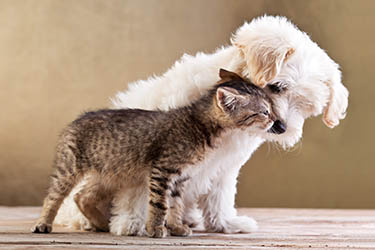New Puppy and Kitten Care

New Year, New Pet? Tips for Puppy and Kitten Parenthood
Perhaps their child was especially good this year, and Santa decided to leave a barking or meowing gift under the tree. Or, with the new year approaching, maybe their family decided it was the perfect time to take the leap into pet parenthood. If your clients welcomed a furry addition over the holidays, be sure to share these tips on caring for new puppies and kittens:
Get in gear
If a pet is new to your family, you may not have all of the essentials to keep your pet safe, healthy and comfortable. Some of the basics include:
Puppies:
- Dog beds (get a backup for when the first needs cleaning!)
- Food and water bowls
- Food and treats
- Crate (for training)
- Puppy-safe toys that can’t be swallowed
- Collar and leash
- Brush and comb if necessary for your puppy’s coat
Kittens:
- Cat bed
- Food and water bowls
- Food and treats
- Litter box
- Cat carrier (for vet visits)
- Scratching pad or post
- Kitten-safe toys that can’t be swallowed
- Cat brush
Make healthcare a priority
Much like the first doctor visit shortly after the birth of a child, the first place you should take your new pet is the vet. Both kittens and puppies benefit from an initial checkup and consultation to establish a preventive care routine within a week of coming home. Vets will recommend a vaccination schedule, options to manage fleas, ticks, and other parasites, and a timeframe on when it is best to spay or neuter your animal. Don’t hesitate to ask questions, either! Vets can provide valuable advice on food, socializing, training and more.
Nutrition matters
Your new pal might be tiny, but he or she needs big-time nutrients. That’s why it’s important to buy quality pet food especially formulated for puppies or kittens.
For cats, experts recommend kitten-specific food until 9-12 months old, while for dogs, breed makes a difference: small to medium breeds can switch to adult food at 9-12 months; large breeds should stick to puppy kibble until 2 years of age.
Make sure your animal also has ample access to clean, fresh water throughout the day.
Bathroom basics
No one wants unexpected messes inside, so it’s best to start housetraining as soon as possible. Cats usually adjust to litterboxes instinctually, but placing a new kitten in the box after meals and playtime can help ensure she knows where to find it.
For puppies, training will take a bit longer. Be sure to establish a routine by taking Spot outside when you wake up, immediately after meals and naps, during and after physical activity and before bedtime. Praise and patience are a must. Give him lots of positive reinforcement after a job well done and resist the urge to punish him for accidents.
Fun and games — and training
Puppies and kittens are inherently playful. Make the most of their energy by taking time each day to play and introduce the animals to new experiences.
Kittens benefit from frequent petting and new toys. Give them options to explore (cats love cardboard boxes and paper bags) and healthy scratching alternatives. While many cats will remain wary around loud sounds and strangers throughout their lives, playing music and inviting friends over may help a kitten become less skittish. Always reward good behavior with praise and treats and redirect bad habits such as biting or scratching.
Puppies thrive with reward-based training and need to learn basic commands such as sit, stay and down, for their safety as well as the pet parent’s peace of mind. Obedience classes may help a rambunctious little one, while closely monitored socializing with humans and other animals will help a pup grow into an agreeable adult. Be sure puppies get ample time to let out all that youthful energy with frequent walks and play.
Above all, expect the unexpected
Let’s face it, kittens and puppies are undeniably adorable. The cuteness factor alone is one of the main reasons it’s so easy to bring one home. But just like raising a small child, puppies and kittens need appropriate healthcare, discipline, care supplies and socialization, as well as affection. And, like children, their behavior can often be unpredictable or challenging. Remind your clients that it’s necessary to be patient and most importantly, ready for anything!
Covetrus is dedicated to the well being of pets throughout their lives. Visit us online or contact your Covetrus representative at 855.724.3461 to order supplies and medications for your practice.
Sources
http://www.vetstreet.com/care/puppy-basics-101-how-to-care-for-your-new-dog
https://petcube.com/blog/puppy-guide/
https://www.petfinder.com/cats/cat-care/kitten-care-must-know-tips-for-raising-kittens/
http://www.vetstreet.com/kitten-basics-101-taking-care-of-your-new-kitten
Careers
Are you looking for a place to let your talents shine? At Covetrus, we help our practitioner customers better serve their patients and take pride in providing the best customer experience possible. Search our open positions to see our available opportunities.
Newsletter
Stay current with what’s going on with Covetrus, subscribe to receive our newsletter and email communications. Subscribers will receive the latest information in practice management, sales and marketing, animal health, and more.


Leave a comment